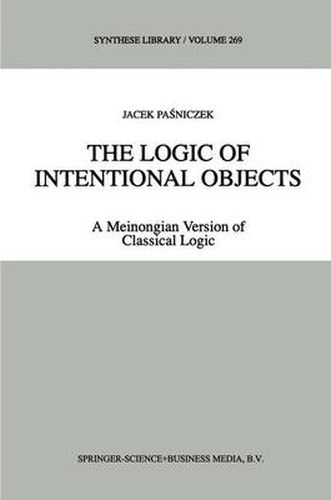Readings Newsletter
Become a Readings Member to make your shopping experience even easier.
Sign in or sign up for free!
You’re not far away from qualifying for FREE standard shipping within Australia
You’ve qualified for FREE standard shipping within Australia
The cart is loading…






This title is printed to order. This book may have been self-published. If so, we cannot guarantee the quality of the content. In the main most books will have gone through the editing process however some may not. We therefore suggest that you be aware of this before ordering this book. If in doubt check either the author or publisher’s details as we are unable to accept any returns unless they are faulty. Please contact us if you have any questions.
Intentionality is one of the most frequently discussed topics in contemporary phenomenology and analytic philosophy. This book investigates intentionality from the point of view of intentional objects. According to the classical approach to this concept, whatever can be consciously experienced is regarded as an intentional object. Thus, not only ordinary existing individuals but also various kinds of non-existents and non-individuals are considered as intentional (including such bizarre entities as quantifier objects: some dog , every dog ). Alexius Meinong, an Austrian philosopher, is particularly well-known as the inventor of an abundant ontology of objects among which even incomplete and impossible ones, like the round square , find their place. Drawing inspirations from Meinong’s ideas, the author develops a logic of intentional objects, M-logic. M-logic closely resembles classical first-order logic and, as opposed to the formally complicated contemporary theories of non-existent objects, it is more friendly in apprehending and applications. However, despite this resemblance, the ontological content of M-logic far exceeds that of classical logic. In this book formal investigations are intertwined with philosophical analyses. On the one hand, M-logic is used as a tool for investigating formal features of intentional objects. On the other hand, the study of intentionality phenomena suggests further ways of extending and modifying M-logic. The text is addressed to logicians, cognitive scientists, philosophers of language and metaphysics with either a phenomenological or an analytic background.
$9.00 standard shipping within Australia
FREE standard shipping within Australia for orders over $100.00
Express & International shipping calculated at checkout
This title is printed to order. This book may have been self-published. If so, we cannot guarantee the quality of the content. In the main most books will have gone through the editing process however some may not. We therefore suggest that you be aware of this before ordering this book. If in doubt check either the author or publisher’s details as we are unable to accept any returns unless they are faulty. Please contact us if you have any questions.
Intentionality is one of the most frequently discussed topics in contemporary phenomenology and analytic philosophy. This book investigates intentionality from the point of view of intentional objects. According to the classical approach to this concept, whatever can be consciously experienced is regarded as an intentional object. Thus, not only ordinary existing individuals but also various kinds of non-existents and non-individuals are considered as intentional (including such bizarre entities as quantifier objects: some dog , every dog ). Alexius Meinong, an Austrian philosopher, is particularly well-known as the inventor of an abundant ontology of objects among which even incomplete and impossible ones, like the round square , find their place. Drawing inspirations from Meinong’s ideas, the author develops a logic of intentional objects, M-logic. M-logic closely resembles classical first-order logic and, as opposed to the formally complicated contemporary theories of non-existent objects, it is more friendly in apprehending and applications. However, despite this resemblance, the ontological content of M-logic far exceeds that of classical logic. In this book formal investigations are intertwined with philosophical analyses. On the one hand, M-logic is used as a tool for investigating formal features of intentional objects. On the other hand, the study of intentionality phenomena suggests further ways of extending and modifying M-logic. The text is addressed to logicians, cognitive scientists, philosophers of language and metaphysics with either a phenomenological or an analytic background.